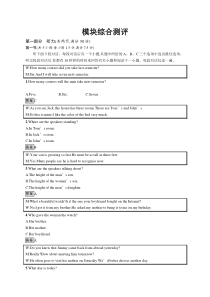 DOC
DOC
【文档说明】模块综合测评.docx,共(18)页,51.155 KB,由小赞的店铺上传
转载请保留链接:https://www.doc5u.com/view-afc6a5007dae49e7c771b1ec12919d0a.html
以下为本文档部分文字说明:
模块综合测评第一部分听力(共两节,满分30分)第一节(共5小题;每小题1.5分,满分7.5分)听下面5段对话。每段对话后有一个小题,从题中所给的A、B、C三个选项中选出最佳选项。听完每段对话后,你都有10秒钟的时间来回答有关小题和阅读下一小题。每段对话仅读一遍。W:Ho
wmanycoursesdidyoutakelastsemester?M:Six.AndIwilltakesevennextsemester.1.Howmanycourseswillthemantakenextsemester?A.Five.B.Six.C.Seven.答案CW:Asyousee,
Jack,thishousehasthreerooms.ThoseareTom’sandJohn’s.M:Sothisismine.Ilikethecolorofthebedverymuch.2.Wherearethespeakerssta
nding?A.InTom’sroom.B.InJack’sroom.C.InJohn’sroom.答案BW:Yoursonisgrowingsofast.Hemustbeastallasthreefeet
.M:Yes.Manypeoplesayheishardtorecognisenow.3.Whatarethespeakerstalkingabout?A.Theheightoftheman’sson.B.Thehei
ghtofthewoman’sson.C.Theheightoftheman’sdaughter.答案AM:Whatabeautifulwatch!IsittheoneyourboyfriendboughtontheInternet?W:No,Igotitfrommybrother.He
askedmymothertobringittomeonmybirthday.4.Whogavethewomanthewatch?A.Herbrother.B.Hermother.C.Herboyfriend.答案AW:DoyouknowthatJimmycamebackfrom
abroadyesterday?M:Really?Howaboutmeetinghimtomorrow?W:HeoftengoestovisithismotheronSaturday.We’dbetterchooseanotherday.5.Whatdayistod
ay?A.Saturday.B.Thursday.C.Friday.答案C第二节(共15小题;每小题1.5分,满分22.5分)听下面5段对话或独白。每段对话或独白后有几个小题,从题中所给的A、B、C三个选项中选出最佳选项。听每段对话或独白前,你将有时间阅读各个小题
,每小题5秒钟;听完后,各小题将给出5秒钟的作答时间。每段对话或独白读两遍。听第6段材料,回答第6、7题。M:What’sthehurry?W:Oh,Mondayisalwaysverybusy.Well,westartwithadiscussionatteno’clock
.Thenwehaveanhouroff,togotothelibraryandcatchuponsomereading,andatoneo’clockwehavealectureoncomputerdrawing.M:Notimeforlunch,then!W:No,exactly!An
dwefinishthedaywithalectureonhistory.M:Wow!Thatisafullday.W:Oh,Ihavetoleavenow.It’stenminutestoten.6.
HowmanylecturesdoesthewomanhaveonMonday?A.One.B.Two.C.Three.答案B7.Whatwillthewomanprobablydonext?A.Haveadiscussion.B.D
osomereading.C.Makeadrawing.答案A听第7段材料,回答第8、9题。W:Whydidyoucometoworktoday?Ithoughtyoutookafewdaysoff.M:No,that’snextwee
k.I’mtakingtwoweeksofffromworkandIcan’twait!W:Areyougoingonatour?M:Notthistime.It’stooexpensive.ButIdohaveafewdif
ferentideasthatwillkeepmebusy.W:Whatareyouplanning?M:Well,IhaveafriendinPariswhoIhaven’tseenforages,soIcouldgothere.I’dliketopopu
ptoBerlintoseemysisterforafewdays.There’salsoasaleinBrementhatI’veseenand...!W:Wow,that’salot!8.What’stheprobablerelationshipbetweenthespeake
rs?A.Couple.B.Friends.C.Colleagues.答案C9.Whereistheman’ssisterprobably?A.InParis.B.InBerlin.C.InBremen.答案B听第8段材料,回答第10至
12题。W:I’mcallingaboutasuitcase.Ilostityesterday.M:Well,let’sputthedetailsintothecomputer.W:OK,it’ssm
allandit’sblack.M:Werethereanyitemsinsideit?W:Yes.Ihadofficekeysinthere.Myhousekeyswereinmypocket.Um,therewerealotofdocume
nts.ButthethingI’mreallyworriedabout—Imean,thereisacameraIjustbought.M:Itwasyesterday.SothatwasonMaythe13th.W:
Yes.Iwasheadingtomyhome.IwasverytiredwhenIwasintheairport.Ithinkthat’swhyIjustforgotaboutthecase.M:Whatkindoftransportwereyouusing?W:Ithought
aboutgettingthetrain,butthatwouldhavemeantabusjourneyaswell,andIcouldn’tbebotheredsoIdecidedtotakeataxiatlast.That’sw
hereImusthaveleftit.M:Well,ifsomeonehandeditin,we’llletyouknow.W:Thanks.10.Whatisthewomanmostworriedab
out?A.Hercamera.B.Herdocuments.C.Herhousekeys.答案A11.Whatdateisittoday?A.May12th.B.May13th.C.May14th.答案C12.Wheredidthew
omanleavehersuitcase?A.Onatrain.B.Inataxi.C.Onabus.答案B听第9段材料,回答第13至16题。M:Hi,couldIspeaktotheorganiserofthePrestonParkRun?W:Yes,that’sme.Whatwould
youliketoknow?M:Wheredoestherunstart?W:Itstartsfromthecafé,goespastthesportscentreandthecitylibrarythentwicearoundthelakeand
goesbackwhereitstarted.M:Howlongistherun?W:Itusedtobethreekilometresbutmostpeoplewantedtodoabitmorethanthat.We
nowgoroundthelaketwiceandthataddsanextratwokilometres.M:SohowdoIenter?W:Icouldtakeyourdetailsbyphonebutify
ouwanttoenterit,you’dbetterusethewebsite.M:OK.Canyoutellmeanythingaboutthevolunteering?MyfriendSarahisinterestedinit.W
:Shecanhelpwithguidingtherunners.Wealsoneedsomeonewhocandoareportontherace.M:Well,myfriendreallylikestak
ingphotographs.W:OK.13.Wheredoestherunstart?A.Fromthecafe.B.Fromthesportscenter.C.Fromthecitylibrary.答案A14.Howlongistherun?A.Fivekil
ometres.B.Threekilometres.C.Twokilometres.答案A15.Howdoesthewomanadvisethemantoentertherace?A.Byphone.B.Inperson.C.BytheInternet.答案C1
6.WhatwillSarahprobablyhelpdo?A.Takepictures.B.Reporttherace.C.Guidetherunners.答案A听第10段材料,回答第17至20题。WelcometothenewSeaLifeCentre.Well,it’sanexciti
ngplace.Therearesomanythingstodo.Itcosts£3.70foradults,£2.50forchildrenandlessforoversixtiesandschoolgr
oups.It’sopeneverydayoftheyear.Specialattractionsforchildrenincludeaquizandhourlyfeedingtimesforallthediffere
ntanimalsandfish,startingat9:30.Everymorningfrom10:00,therearevideoshowsforchildreninthesealifetheatre.Ifyouareinagroupofsixormorepeop
le,theycangiveyouaspecialguidedtourofthecentre.Thenewandmodernareaatthecentreisabigglassbridgeyoucanwalkacross.Youwillseel
otsoffishswimming—sometimesevenunderyourfeet.Whenyougethungry,thereisarelaxedfamilydiningareaservingsnacks,colddrinksandicecreams.Nearthemaine
ntrancethereisanexcellentbookshop.Ifyouwanttobuysomegifts,well,thereis...17.Howmuchdochildrenneedtopayforthecentre?A.£3.70.B.£3.00.C.£
2.50.答案C18.Whocangetaspecialguidedtourofthecentre?A.Peoplewhotakeanunderseavoyage.B.Peoplewhoareinagroupofsixormore.C.Peoplewhoareovers
ixty.答案B19.Whatactivityisnewatthecentre?A.Tofeeddifferentanimals.B.Tovisitasealifetheatre.C.Towalkacrossag
lassbridge.答案C20.Whatwillthespeakertalkaboutnext?A.Adiningarea.B.Agiftshop.C.Abookstore.答案B第二部分阅读(共两节,满分50分)第一节(共15小题;每小题2.5分,满分37
.5分)阅读下列短文,从每题所给的A、B、C、D四个选项中选出最佳选项。A2021JournalismWorkshopLearnPrint,Radio,Television,DigitalHighschoolstudentsintheWashingto
n,DCareaareinvitedtoapplytotheWashingtonAssociationofBlackJournalists’annualUrbanJournalismWorkshop.WABJh
asbeenguidingthenextgenerationofjournalistssince1986throughthisprogramme.UJWwasstartedbylong-timeChicagoTribuneandSt.LouisTimesDispatchreporterGeor
geCurryandformerWashingtonPostreporterAtheliaKnight.Duringtheworkshop,studentslearnthefundamentalsofpri
nt,radio,TVanddigitaljournalism.CurrentandformerprofessionaljournalistsofWashingtonPost,NPRandothermediacompaniesvolunteertoteach
participants.Ascholarshipisofferedforqualifyingseniors.•SessionsareheldforeightcontinuousSaturdaysfromFebruary2
9toApril18,9a.m.-4p.m.•Scholarshipcriteriaincludeanessay,storiesproducedintheworkshop,classattendanceandparticipationinalleightsessions.•Highschools
tudents,allclassifications,inthegreaterDCareaareencouragedtoapply.StudentsshouldcontactUJWCoordinatorTrinaWilliamsatujwdc@aol.comfordetailsorcheckwit
htheirhighschooladvisers.Todownloadanapplication,readmoreaboutavailablescholarshipsorlearnabouttheUrbanJournalismWorkshop,visitwww.u
jwonline.org,orcontactUJWCoordinatorTrinaWilliamsatujwdc@aol.com.ApplicationsandrequiredmaterialsmustbereceivedbyFriday,January29.【语篇解读】本文是一
篇说明文。文章主要介绍了一个研讨会的相关信息,在研讨会期间,学生们会学习印刷、广播、电视和数字新闻的基础知识。21.Whatcanbelearntifthestudentsjointheworkshop?A.T
hemanagementoftheUJW.B.Thebasicskillsofdigitaljournalism.C.Theclassificationofelectronicdevices.D.Thequalitie
sofenvironmentaljournalists.答案B解析细节理解题。根据第一段中的“Duringtheworkshop,studentslearnthefundamentalsofprint,radio,TVanddigitaljournalism.”可知,在研
讨会期间,学生学习印刷、广播、电视和数字新闻学的基础知识。故选B项。22.Whichdateissuitableforparticipantstoattendtheworkshop?A.Saturday,April11.B.Wednesda
y,March18.C.Wednesday,January29.D.Saturday,February22.答案A解析推理判断题。根据第二段中的“SessionsareheldforeightcontinuousSaturdaysfromFebruary29toApril18”可知,
研讨会的时间为2月29日至4月18日,连续八个星期六。结合选项可知,4月11日(星期六)适合参与者参加研讨会。故选A项。23.Inwhichsectionofanewspapermaythistextappear?
A.Sports.B.Education.C.Science.D.Entertainment.答案B解析推理判断题。根据第一段中的“HighschoolstudentsintheWashington,DCareaareinvitedt
oapplytotheWashingtonAssociationofBlackJournalists’annualUrbanJournalismWorkshop.”可知,华盛顿特区的高中生应邀参加华盛顿黑人记者协会的年度城市新闻研讨会。文中还提到了scholarship(奖学金),因
此文章的话题与教育有关,应出自报纸的教育栏目。故选B项。BAteleven,Idecidedtolearntoswim.TherewasapoolattheYMCAofferingexactlytheop
portunity.Mymothercontinuallywarnedagainstit,andkeptfreshinmymindthedetailsofeachdrowningintheriver.ButtheYMCApoo
lwassafe.Ihadachildhoodfearofwater.ThisstartedwhenIwasthreeyearsoldandmyfathertookmetothebeach.Thehugewaveskno
ckedmedownandsweptoverme.Thepoolwasquiet.Iwasafraidofgoinginallalone,soIsatononesideofthepooltowaitforothers.
Thencameabigboy.Heyelled,“Hi,how’dyouliketobeducked?”Withthathepickedmeupandthrewmeintothedeepend.Ilandedinasittingposition,andswallowedwater
.ButIwasnotfrightenedoutofmywits—whenmyfeethitthebottom,Iwouldmakeabigjumptocomeoutofthesurface.Itseemedalongwayd
own.IgatheredallmystrengthwhenIlandedandmadewhatIthoughtwasagreatspringupwards.ThenIopenedmyeyesandsawnothingbutw
ater.Itriedtoyellbutnosoundcameout.Iwentdown,down,endlessly.WhenIcametoconsciousness,Ifoundmyselflyingonthebedintheho
spital.Ineverwentbacktothepool.IavoidedwaterwheneverIcould.Thismisadventurestayedwithmeastheyearsrolledby.Itdeprived(剥夺)meofthejoyof
boatingandswimming.Finally,Idecidedtogetaninstructor.Piecebypiece,hebuiltaswimmer.Severalmonthslater,theinstructionwasfinished,butIwasnot.Somet
imestheterrorwouldreturn.ThiswentonuntilJuly.IswamacrosstheLakeWentworth.Onlyoncedidtheterrorreturn.WhenIw
asinthemiddleofthelake,Iputmyfaceunderandsawnothingbutbottomlesswater.Ilaughedandsaid,“Well,MrTerror,whatdoyouthinkyoucandotome?”Ihadco
nqueredmyfearofwater.【语篇解读】本文是一篇记叙文。三岁时作者随着父亲在海滩玩耍,曾被海浪撞倒过,自此作者对水产生了恐惧;十一岁学习游泳时,作者被一个男孩扔进游泳池,这次经历让作者自此远离了划船和游泳。但作者仍然想享受游泳的乐趣
,于是作者请了专业指导老师,指导结束后作者仍然没有克服对水的恐惧。后来在一次游泳中,作者终于克服了对水的恐惧。24.Whatwastheauthor’soriginalfearofwatercausedby?A.Hispoorskillinswimming.B.Hismother
’swarningofdrowning.C.Anoutingtothebeachwithhisfather.D.Anunpleasantmemoryofthepool.答案C解析细节理解题。根据第二段,特别是该段前两句可知,作者对水的恐惧源
于三岁的时候被父亲带到海滩,被海浪撞倒的经历,故C项正确。第三段描述了被一个男孩扔进游泳池的经历给作者的影响,但与题干中的original一词不符。25.Whywastheauthornotscaredtodeathwhenhew
asthrownintothewater?A.Heknewhowtoswiminthepool.B.HefeltthattheYMCApoolwassafe.C.Hewaswaitingforotherstosavehim.D.Hecameupwithanideatogo
upwards.答案D解析细节理解题。根据第三段中的“ButIwasnotfrightened...tocomeoutofthesurface”可知,作者并不害怕,因为他认为一旦他的脚能够到池底,他就能猛跃,跳出水面。据此可知,作者并不害怕的原因是他想到了跳出水面的方法,故D项正确。26.What
doestheauthorprobablymeanbyexpressing“butIwasnot”inParagraph5?A.Hewasstillapoorswimmer.B.Hehadnotovercomethefeary
et.C.Hewasnotafraidofdrowninganymore.D.Hewasnotsatisfiedwiththeswimmingtraining.答案B解析句意理解题。根据画线句的后一句“Sometimesthe
terrorwouldreturn.”可知,有时恐惧还会卷土重来;据此可以判断,画线句表示作者还没能克服恐惧,故B项正确。27.Whichofthefollowingisthebesttitleforthetext?
A.Goodbye,MrTerrorB.Hello,ChildhoodFearC.ASwimmingAdventureD.MyPassionforSwimming答案A解析主旨大意题。结合全文内容可知,文章主要讲述
了作者克服对水的恐惧的过程,故A项最适合作本文的标题。CScientistsinWesternAustraliaclaimtohavemadeanewdiscovery—theyhavefoundgoldinthelea
vesandtwigsoftrees.Theresearchersbelievethatthetreessuckupthegoldfromdeepunderground,over30metresdown.Thediscoveryh
asbeendescribedasthefirstofitskindintheworld.Australiangoldexplorationcompaniesarepleasedbecauseitwillmakefindinggoldcheaper
.Ratherthandrillingdeepholestofindgold,theyhavemorewaystoexaminetreeleavesandbranches.Thereisonlyatinyamountofgoldintheleaves.Itwoul
dtake500treestomakeonegoldring.ThegoldisfoundbyusingaspecialX-raymachineownedbyanAustraliangovernmentagency.ApureX-rayandapowerfulmicroscopescant
heleavesandbranches.Theclaimthatthisisthefirsttimethatgoldparticles(微粒)havebeenfoundinlivingmaterialmightnotbetrue,though.Pre-QinChineseofgreatwi
sdomunderstoodtheconnectionbetweenplantsandthepreciousstonesandmineralsunderneaththem.Theyusedtheplantlifetofindmineral
sthousandsofyearsago.IntheZhouDynasty,itwaswritteninabookthatacertainplantgrewonlyneardepositsofgold.Overthenext2,000years,Chinesepeoplewroteabo
utdifferentplantsandhowtheygrew,andshowedwheremineralsandpreciousstones(suchasjade,copper,lead,silverandgold)were.Evenmoreimportantly,inthe11th
century,SuSongdescribedhowcopper,gold,silver,leadandtinwereobservedandtakenfromcertainplants.Thesewereamazingscientificdiscoveri
es.Meanwhile,thisknowledgewasunknownintherestoftheworlduntilabout1,600.ThiswaswhenaBritishmanrealisedthatoaktreesgrewlargerandgr
eenerwheretherewasalum(明矾)intheground.MaybeancientChinesehavemoreknowledgetoteachmodernscientists.【语篇解读】本文是一篇说明文。西澳大利亚州的科学家声称他们在树叶和树枝中发
现了黄金。这项发现被认为是世界上第一次在生物材料中发现黄金微粒。然而,这种说法可能并不正确,因为早在周朝,中国就已经有了相关记载。28.WhatcanweknowfromParagraph1?A.500de
adtreescanmakeonegoldring.B.Thetreescanabsorbgoldfromdeepunderground.C.Scientistshavefoundgold30metresbelowunderground.D.Thecompaniesfindit
hardtofindgold.答案B解析细节理解题。根据第一段中的“Theresearchersbelievethatthetreessuckupthegoldfromdeepunderground,ove
r30metresdown.”可知,树木可以从地下吸收黄金,故B项正确。29.Howdoscientistsfindgoldintheleaves?A.Byobservingtheleavescarefully.B.Byd
rillingdeepholes.C.ByusingaspecialX-raymachine.D.Byreferringtoancientbooks.答案C解析细节理解题。根据第一段中的“ThegoldisfoundbyusingaspecialX-raymac
hineownedbyanAustraliangovernmentagency.”可知,科学家通过一种特殊的X光机找到树叶里的黄金,故C项正确。30.Whofirstdiscoveredthattherewasaconnectionbetweenpla
ntsandminerals?A.Pre-QinChinesepeople.B.SuSong.C.Australianscientists.D.ABritishman.答案A解析推理判断题。根据第二段中的“Pre-QinChineseofgreatwisdomunde
rstoodtheconnectionbetweenplantsandthepreciousstonesandmineralsunderneaththem.”可知,先秦时期的先贤们最早理解植物与它们下面的宝石和矿物之间的联系,故A项正确。31.
Whatisthepurposeofthelastparagraph?A.Tointroducetwogreatscientistsinancienttimes.B.Toprovidemoreevidencetosupportthewrite
r’sopinion.C.Toshowhowancientpeoplegotgoldfromcertainplants.D.ToprovethatancientChinesehavemoreknowledgethanmodernscientists.答案B解
析推理判断题。根据第二段内容可知,作者认为西澳大利亚州的科学家们在树叶和树枝中发现黄金并不是世界上第一次在生物材料中发现黄金,因为早在周朝,中国就已经有了相关记载;接着最后一段又列举了苏颂在11世纪描述如何在某些植物中观察并提取到铜、金
等;大约1600年,一个英国人注意到橡树在有明矾的土里长得更好。由此可知,最后一段的写作目的是提供更多的证据来支持作者的观点,故B项正确。DAsInternetusersbecomemoredependentontheInternettost
oreinformation,arepeoplerememberingless?Ifyouknowyourcomputerwillsaveinformation,whystoreitinyourownpersonal
memoryandyourbrain?ExpertsarewonderingiftheInternetischangingwhatwerememberandhow.Inarecentstudy,ProfessorBetsySparrowconductedsomeexperiments.Shean
dherresearchteamwantedtoknowwhethertheInternetischangingourmemory.Inthefirstexperiment,theygavepeople40unimpo
rtantfactstotypeintoacomputer.Thefirstgroupofpeopleunderstoodthatthecomputerwouldsavetheinformation.Thesecond
groupunderstoodthatthecomputerwouldnotsaveit.Later,thesecondgrouprememberedtheinformationbetter.People
inthefirstgroupknewtheycouldfindtheinformationagain,sotheydidnottrytorememberit.Inanotherexperiment,theresearchersgavepeoplefacts
toremember,andtoldthemwheretofindtheinformationontheInternet.Theinformationwasinaspecificcomputerfolder(文件夹).Surprisingly,peoplelate
rrememberthefolderlocation(位置)betterthanthefacts.WhenpeopleusetheInternet,theydonotremembertheinformation.Rather,t
heyrememberhowtofindit.Thisiscalled“transactivememory(交互记忆)”.AccordingtoSparrow,wearenotbecomingpeoplewithpoormemoriesasaresultoftheInternet.Instea
d,computerusersaredevelopingstrongertransactivememories;thatis,peoplearelearninghowtoorganisehugequantitiesofinfor
mationsothattheyareabletoaccessitatalaterdate.Thisdoesn’tmeanwearebecomingeithermoreorlessintelligent,butthereisnodoubtthatthewayweuseourmemoryi
schanging.【语篇解读】本文是一篇说明文。随着互联网用户越来越依赖互联网存储信息,人们的记忆是否越来越少?如果你知道你的电脑会保存信息,为什么要把它存储在你自己的个人记忆,你的大脑里呢?本文主要讲述了互联网给人类的记忆带来的影响。32.Whydoesthep
assagebeginwithtwoquestions?A.Tointroducethemaintopic.B.Toshowtheauthor’sattitude.C.TodescribehowtousetheInternet.
D.Toexplainhowtostoreinformation.答案A解析推理判断题。第一段中的“ExpertsarewonderingiftheInternetischangingwhatwerememberandhow.(
专家们想知道互联网是否正在改变我们的记忆,以及如何改变我们的记忆。)”是本文的中心话题。因此推断,作者使用两个问句是为了引出要讨论的话题。33.Whatcanwelearnaboutthefirstexperiment?A.Sparrow’steamtypedtheinformation
intoacomputer.B.Thetwogroupsrememberedtheinformationequallywell.C.Thefirstgroupdidnottrytoremembertheinformation.D.Thesecondgroupdidno
tunderstandtheinformation.答案C解析细节理解题。根据第二段中的“Peopleinthefirstgroupknewtheycouldfindtheinformationagain,sothe
ydidnottrytorememberit.”可知,第一组没有尽力记住信息。34.Whatdopeopledointransactivememory?A.Tokeeptheinformationinmind.B.Tochangethe
quantityofinformation.C.Toorganiseinformationlikeacomputer.D.Torememberhowtofindtheinformation.答案D解析细节理解题。根据倒数第二段中
的“Rather,theyrememberhowtofindit.Thisiscalled‘transactivememory(交互记忆)’”.可知,在交互记忆里,人们记得怎样找到信息。35.WhatistheeffectoftheInterne
taccordingtoSparrow’sresearch?A.Weareusingmemorydifferently.B.Wearebecomingmoreintelligent.C.Wehavepoorermemoriesthanbefore.D.Weneedabetterwaytoacces
sinformation.答案A解析细节理解题。根据最后一段“butthereisnodoubtthatthewayweuseourmemoryischanging”可知,互联网对人们的记忆产生的影响是它改变了我们使用记忆力的方式。第二节(共5小题;每小题2.5分,满12.5分)
阅读下面短文,从短文后的选项中选出可以填入空白处的最佳选项。选项中有两项为多余选项。Onetruthaboutmodernlifeisthatnobodyhasanytime.36Solet’stryasimplethoughtexperiment.Imagineth
atyoucameintopossessionofamagicalnewsetoftechnologiesthatcouldautomateorpromoteeverysinglepartofyourjob.37Maybeyou’d
pickupahobby,orhavemorechildren,orlearntorelaxandenjoyyourselfintheadditionalleisure.ButwhatifItoldyouthatyouwouldn’tdoanyofthosethings
:Youwouldjustworktheexactsameamountoftimeasbefore.38Buttherearesimplereasonsforthis.Bettertechnologymeanshigherexp
ectationsandhigherexpectationscreatemorework.Formostofhistory,humanswereforcedtosufferfromtheirowndir
tyandunpleasantsubstances.Mostfamilies’clotheswerewashedtwiceayear.Thefleetofhouseworktechnologiesthatc
ameintotheworldsuddenlybetweenthelate-19thandmid-20thcenturycreatednewnorms(标准)ofcleanliness—forourfloors,ourclothesando
urselves.39Automaticwashersanddryersraisedourexpectationsforcleanclothesandencouragedpeopletogooutandbuynewshirtsandpants;housewivesthereforehad
moreloadsoflaundrytowash,dry,andfold.Inshort,technologymadeitmucheasiertocleanahouseto1890sstandards.40Theywant
edamodernhomewithdustlesswindowsills(窗台)andshinyfloorsandthisdustlessshinyrequireda40-to-50-hourworkweek,evenwiththeass
istanceofmoderntools.A.Youarewastingyourtime.B.Thismightseemimpossible.C.Newnormsmeantmorework.D.Whatwouldyoudowiththeextratime?E.Thatmea
nsyoucanhavemoretimetorelax.F.Everybodyisbusy,burnedout,overloaded.G.Butbythemid-20thcentury,Americansdidn’twantthatoldhouse.答案与解析【语篇解读】本
文是一篇说明文。文章介绍了为什么科学技术不断发展,人还是越来越忙。36.F根据上一句“Onetruthaboutmodernlifeisthatnobodyhasanytime.”可知,关于现代生活的一个真相是没人有时间。由此可推测,接下来应该讲“为什么没人有时间”。故选F项。37
.D上文内容“Imaginethatyoucameintopossessionofamagicalnewsetoftechnologiesthatcouldautomateorpromoteeverysinglepartofyourjob.”的意思是,想象一下你拥有
一套神奇的、新的、能够使你的工作自动化或者促进你的工作的技术。下文“Maybeyou’dpickupahobby”的意思是,或许你会开始学习一个爱好。此空应承上启下,故推测此处应询问:你会用这些额外的时间做什么?故选D项。38.B上文提到,假设你的工作自动化了或效率提高了,你还会和之前工作的
时间一样长。此空应该表达不相信、不合理、不可能发生的意义。故选B项。39.C根据下文内容可知,自动洗衣机和甩干机提高了我们清洁衣服的期望,鼓励了人们购买更多的衣服,于是家庭主妇有了更多的衣服要洗,要甩干,要整理。再结合上文提到家务技术创
造了新标准,推测此空应说明新的标准带来了更多的工作。故选C项。40.G根据上一句可知,科技使清洁房子达到19世纪90年代的标准更容易了;下文介绍了他们想要的房子的样子。再结合文章大意可知,随着科技的进步,标准的提高,人的要求也随之变高。由此推测,此空应讲述20世纪中叶的美国人不想要达到上世纪9
0年代标准的旧房子。故选G项。第三部分语言运用(共两节,满分30分)第一节(共15小题;每小题1分,满分15分)阅读下面短文,从每题所给的A、B、C、D四个选项中选出可以填入空白处的最佳选项。Iwaswalkinginaparkonacoolautumnmorning.
Theviewwascharming,andapleasantbreeze(微风)waskissingmyface41.ThenIsawamotherandherlittlebaby.Themotherwore42clothesthatseemedt
obefoundinadustbin.Howeasyitisforfortunatepeopleto43awaythingstheydon’tneed,andtheydothis44thinkingoftheunfortunate!Shewasholdingherbaby,protecti
ngherfromthemorning45andexpectingsomemoneyfromstrangerssothatshecould46foodforbothofthem.ItwasthenthatIrealisedhow47Ihadbeeninmywho
lelifeforlivingarichlife.Thenaman48somemoneyandfoodtothemother,andasshetookthem,herfacewas49asifshehadbeenthehappiestpersonin
theworld.Andwhynot?Shecouldnow50herbabyatleastfortheday.Actuallyhappinessdoesn’t51yourluck,yourfinan
cialorphysicalconditions,butonlyonyourself.Itisjusta52inyourhands.Ifyouchoosetobehappy,53canstopyoufromit.How54itisthatoneobserv
ationcanchangeyourlife!Lifehasalottoofferifyouobserveveryclosely.Onewhoobservescan55realhappiness.【语篇解读】本文是一篇夹叙夹议文。幸福
是一种选择,与经济状况、身体状况等没有必然的联系。一个善于发现日常生活点点滴滴的人,一定可以发现真正的幸福是什么。41.A.stronglyB.graduallyC.gentlyD.normally答案C解析根据前面的“apleasantbreeze”可知,微风应是轻柔地吹过作者的脸颊。stro
ngly“强壮地”;gradually“逐渐地”;gently“温柔地”;normally“正常地”。故选C项。42.A.expensiveB.wonderfulC.perfectD.dirty答案D解析根据后面的“clothesthatseemedtobefo
undinadustbin”可知,这位母亲的衣服似乎是从垃圾桶里捡的,因此衣服是脏的。故选D项。43.A.moveB.pushC.throwD.send答案C解析根据后面的“thingstheydon’tneed”可推断,这里是说把不需要的东西扔掉。44.A.forB.inC
.withinD.without答案D解析根据上下文可推断出,本句指幸运的人很轻易地把他们不需要的东西扔掉,丝毫没有考虑到不幸的人。45.A.coldB.lightC.soundD.fact答案A解析开头提到当时是一个凉爽的秋天的清晨,因此可推断出母亲
抱紧孩子是为了不让其受凉。cold“寒冷”;light“光”;sound“声音”;fact“事实”。故选A项。46.A.saveB.buyC.pickD.share答案B解析根据上文语境可知,母亲想要钱是为了买吃的。故选B项。47.A.wealthyB
.specialC.successfulD.lucky答案D解析对比这位母亲的状况,作者感到自己很幸运。上文中的“fortunatepeople”也是提示。wealthy“富裕的”;special“特殊的”;successful“成
功的”;lucky“幸运的”。故选D项。48.A.donatedB.lentC.promisedD.sold答案A解析由上文可知,这位母亲在乞讨,所以这位男士应该是捐赠给那位母亲一些钱和食物。故选A项。
49.A.sinkingB.shiningC.shakingD.falling答案B解析根据下文可知,母亲受到帮助后因为高兴而脸上绽放光彩。故选B项。50.A.improveB.protectC.deliverD.feed答案D解析母亲
高兴是因为至少这一天可以有东西喂孩子了。improve“提升”;protect“保护”;deliver“传递”;feed“喂养”,故选D项。51.A.goonB.comeoutC.dependonD.turnout答案
C解析根据上下文可知,作者受到启发,认为幸福不是取决于你的运气、经济状况或身体状况,而是取决于你自己。dependon意为“取决于”,故选C项。52.A.symbolB.strengthC.voiceD.choice答
案D解析根据下文中的“Ifyouchoosetobehappy”可知,作者想表明:幸福是一种选择。symbol“象征”;strength“力量”;voice“声音”;choice“选择”。故选D项。53.A.nothingB.somethingC.anythingD.everything答案A
解析句意:如果你选择快乐,那就没有任何东西能够阻止你感到快乐。故选A项。54.A.comfortingB.amazingC.disappointingD.satisfying答案B解析留意生活中的点点滴滴会改变人的生活,这是令人惊奇的事情。comforting“
舒服的”;amazing“令人惊奇的”;disappointing“失望的”;satisfying“满意的”。故选B项。55.A.inventB.loseC.discoverD.ignore答案C解析一个善于观察日常生活点点滴滴的人,一定可以发现真正的幸福。invent“发明”;lose“
丢失”;discover“发现”;ignore“忽视”。故选C项。第二节(共10小题;每小题1.5分,满分15分)阅读下面短文,在空白处填入1个适当的单词或括号内单词的正确形式。China’sfirstartificialintel
ligence(AI)textbookforhighschoolstudents56.(bring)outin2018,followingaplanbythecentralgovernment57.(include)AIcoursesinprimaryandsecondarysc
hool.Thenine-chaptertextbook,58.(name)FundamentalsofArtificialIntelligence,waswrittenbyoutstanding59.(scholar)fromwel
l-knownschoolsnationwide,underthejointeffortsbytheresearchcentreforMOOCatEastChinaNormalUniversityandtheAIstartupSenseTime.ItincludesthehistoryofAI
andhowthetechnologycanbeappliedinareassuchasfacialrecognition,autodrivingandpublicsecurity.“ThetextbookfocusesnotonlyonthebasicsofAI,bu
tonthe60.(practice)useofAIindailylife,”saidChenYukun,aprofessoratEastChinaNormalUniversity,61.isalsoacontributortothebook.Uptillno
w,about40highschoolsacrossthecountry62.(undertake)thetaskofbeingthefirstgroupofAIhigheducationpilotprogram63.introd
ucingthetextbookinthecurriculum.“TheAIsectorisfacingatalentshortage64.(global).Thepublicationofthebook
is65.breakthroughasittakesAItechnologyoutofthe‘ivorytower’andmakesitpartofhighschoollearning,”saidLinDahua,apr
ofessorattheChineseUniversityofHongKong.答案与解析【语篇解读】本文是一篇说明文。文章介绍了中国第一本高中生人工智能教材。这本专门为高中生编写的人工智能教材在2018年出版。
本文介绍了与此教材相关的信息。56.wasbrought考查动词时态、语态和主谓一致。bringsthout意为“生产……,出版……”,此处表示书被出版,因此用被动语态;时间状语为in2018,因此应该使用一般过去时;又因主
语China’sfirstartificialintelligence(AI)textbook为单数,故填wasbrought。57.toinclude考查非谓语动词。分析句子结构并结合语境可知,此处为不定式作定语
,修饰名词plan。58.named考查非谓语动词。分析句子结构可知,此处为分词短语作定语,修饰Thenine-chaptertextbook,又因name与Thenine-chaptertextbook为逻辑上的动宾关系,故用其过去分词形式named。59.scholars考查名词复
数。scholar意为“学者”,为可数名词,其前无限定词修饰,应用其复数形式。60.practical考查形容词。分析句子结构可知,此处应为形容词,修饰名词use。61.who考查定语从句。分析句子结构可知,此处引导非限制性定语从句,在从句中作主语,先行词指人,故填who。62.haveu
ndertaken考查动词时态和主谓一致。分析句子结构可知,此处应为句子的谓语,由该句中的uptillnow可判断此处应该为现在完成时;又因主语为复数形式,故用haveundertaken。63.by考查介词。根据语境可知,此处表示“通过”,表方式,故
用by。64.globally考查副词。分析句子结构可知,此处作状语,应为副词。65.a考查冠词。breakthrough为可数名词,根据语境可知,此处表示“这本书的出版是一次突破”,表泛指,应用不定冠词,又因breakthr
ough的发音以辅音音素开头,故填a。第四部分写作(共两节,满分40分)第一节(满分15分)假设你是李华。你在网上看到了杜甫草堂招聘志愿者的启事,对此很感兴趣,请根据如下招聘信息写一封申请邮件。VolunteersWant
edAgroupofmiddleschoolstudentsfromAustraliaaregoingtovisittheDuFu’sThatchedCottageonJanuary2nd,2022.Wear
elookingforthreeseniorhighschoolstudentsasvoluntaryguides.ThemainresponsibilitiesaretointroduceDuFutothevi
sitorsandshowthemaroundtheCottage.Ifinterested,pleasesendanapplicationemailatyourearliestconveniencetoMr
Zhangatzhanghua@163.combeforeDecember27.注意:1.词数80左右;2.可以适当增加细节,以使行文连贯。参考范文DearSir,Knowingthatyouwant
voluntaryguidesfortheAustralianmiddleschoolstudentsontheInternet,I’dliketoapplyforit.First,allowmetointroducemyself.
I’mahighschoolstudentwhoisveryinterestedinEnglishandcanspeakEnglishfluently.AndIwonourcity’sEnglishspeechcontestlastyear,soit’snoproblemform
etocommunicatewithforeignfriends,especiallywithmypeers.Inaddition,asanative,IhaveagoodunderstandingofDuFu’sThatchedCo
ttageandvisititonaregularbasiswithmyfriendstolearnmoreaboutourgreattraditionalpoems.I’dappreciateitifIcouldbegiventhisvaluableopportun
ity.Yours,LiHua第二节(满分25分)阅读下面短文,根据其内容和所给段落的开头语续写两段,使之构成一篇完整的短文。Whenshewastwelveyearsold,Rahaearnedascholarshiptostudyata
boardingschoolinEngland.HerfathertoldhertostudyhardandpracticerunningeverydayinEngland.Shenoddedbecauset
hatwaseasierthanstayinghappyinacompletelynewcountry.Severaldayslater,shekissedherfamilyandboardedtheplaneforEng
land.Astheplanetookoff,shelookedoutofthewindowatthegoatsandbrownriversofKenya.Shestareddownatthegreenfieldswheresheusedtorunlikethewind,bare
foot(赤脚的).AtschoolinEngland,Rahahadlotsofmathproblemstosolve,essaystowrite,andbookstoread.Shealsojoinedintheschoolrunningteam.Theywereprepar
ingforanimportantrunningrace,inwhichrunnersfromdifferentschoolstookpart.Inordertopracticerunning,hercoachgaveherastripedshirt,whiteshorts,sh
oeswithcleats(防滑钉)andanotherpairwithspongysoles(吸水鞋底)forcross-country.Honestlyspeaking,shehadalwaysrunbarefootathome,sotheshoe
sfelttight(紧的).ButalltheotherrunnersworeshoesandRahadidn’twanttobedifferent.Theteampracticedeveryweekdayaft
ernoon.OnSaturdays,everyonewatchedfootball—everyonebutRaha.Shewouldrunaloneonthecountryroadsbarefootandrunoverfi
eldsthickwithmudjustasinherhometown.Eachdayatlunch,shewouldsitaloneinthelargedininghall,eatingdishestotall
ystrangetoherandmissingherfamily.OneSaturday,Raharanupahillandfoundherselfinabarnyard(谷仓前的空场地).Tohersurprise,oneofher
classmates,Thomas,stoodjustinsidethebarndoors.Afterhegreetedher,Rahaasked,“Whyaren’tyouwatchingfootball?”“Ihavetohelpmyfather,”saidTho
mas,“butwhyaren’tyouwearingyourshoes?”注意:续写词数应为150左右。Onhearingthisquestion,Rahafeltawkward.Onthedayoftherace,everyrunnerwasdr
essedintheprofessionalsuitandshoesexceptRaha.参考范文Onhearingthisquestion,Rahafeltawkward.However,shecollecte
dhercouragetotellhimthetruth.“Youareusedtorunningbarefoot?That’samazing,”saidThomas.“Buteverybodyhashiswaytodosomet
hing,sojustruninyourownway.”Thenheexpressedhisadmirationandsupporttoher.RahawasmovedtotearstheinstantsheheardwhatTho
massaid.Shealsofeltwarmandencouraged.Fromthenon,shedevotedherselftopracticingrunningeveryday,barefoot.Onthedayoftherace,everyrunnerwasdressedinthe
professionalsuitandshoesexceptRaha.Shestoodonthelane,barefoot.However,shewasnotfeelingashamedbecausethatwasherwaytorun.“
Comeon,Raha,youcanmakeit!”ItwasThomaswhowascheeringforher.Suddenly,shefeltmoreconfident.Atlast,shewonthefirstprizeandbrough
thonourtoherschool.Fromthenon,shecouldnotonlyconcentrateonstudyingandrunning,butshealsostayedhappyinthenewsc
hool.